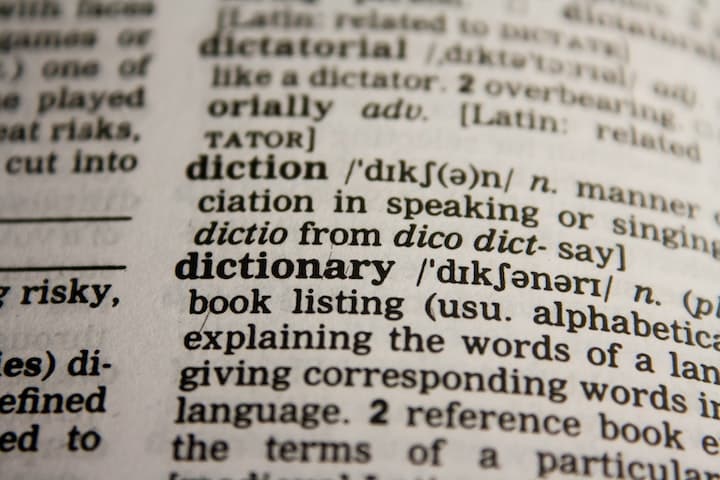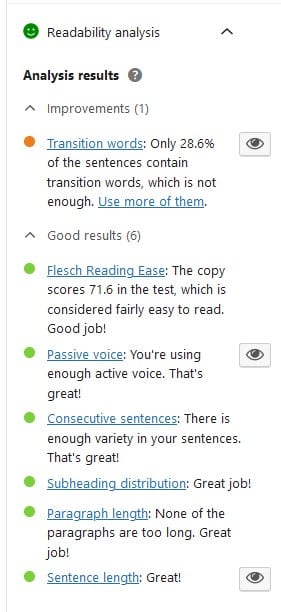How to Stop Using Big Words Unnecessarily in Your Content: 5 Helpful Tips

When you buy something through one of the links on our site, we may earn an affiliate commission.
Using big words might sound cool in person, but in writing, it can have negative results.
Why?
Because it can alienate your audience.
When you write clearly and to the point, without words that confuse people, you build a strong connection with the reader.
And the result is more trust, higher conversions, and increased sales.
This article explains how to stop using big words unnecessarily and why it's important.
Let's dive in.
Contents [show]
The Problem with Using Big Words

On April 10th, 2014, Derek Halpern of Social Triggers published an article and YouTube video titled, The Problem with Using Big Words, stating that big words make you look stupid.
And he's right.
He shares data from Princeton university that confirms it.
Here's what happened:
Raters of three assignments preferred less complicated writing, even assuming the authors were more intelligent than more complex assignments.
So, if you want your blog readers to think you're smart, stop using big words and use shorter, easier to understand words instead.
If you want to watch Derek's video, I'll leave it here:
3 Reasons to Avoid Using Big Words
Here are three more reasons to avoid using big words unnecessarily.
Number three is a biggy.
1. Forces people to think
You can imagine it can't you?
Reading an article, and then suddenly, you hit a wall.
They've used a fancy word that seems irrelevant and worse? It's forcing you to think!
This is the problem with complex words. They make people think, which distracts them from the article's main point.
Even if the reader skims the page, their eyes may glaze over if they see big words only a physics major could understand.
They think they need to know these awkward words or they'll miss something, so they head over to Google, potentially losing them forever.
2. Makes people feel stupid

We've already confirmed that using big words in your writing doesn't make you look good.
But, it also doesn't make your readers feel good either.
If a person doesn't understand a word or complicated jargon, it could bring back bad memories of 10th grade.
So let's not tempt fate by making readers feel stupid with unnecessary words.
3. It breaks rapport
Big words might look decorative, but they hurt your conversions.
It's true: There's not much evidence to back this claim, but we know that trust is essential when connecting with your audience.
Therefore, it's important to be kind to your readers and meet them where they're at.
If you know that 80% of your audience are PhD students, you might get away with a technical term here and there.
But for the rest of us, plain language goes a long way and won't break rapport with your readers.
5 Tips to Avoid Using Big Words Unnecessarily
Here are some guidelines to follow to make your writing as clear and user-friendly as possible.
1. Use words with fewer syllables
Words with fewer syllables are easier to grasp because they take up less mental energy and are faster to read.
When writing content online, try to swap out words with many syllables with shorter ones.
Here are some common words with lots of syllables and their potential counterparts:
- accommodation = hotel, lodge, room
- flexibility = carefree, breezy
- differentiate = discern, know, define
- characteristic = trait
- specification = blueprint, details
- utilize = use
- illustrate = explain
2. Find smaller words that inform context
Similar to the last tip, shorter words can often carry ample context over longer words.
When choosing what to say, opt for shorter, descriptive words if you can.
It's all about context. If you can relay meaning in your writing with less words and shorter sentences, you're onto a winner.
3. Use a Thesaurus
A thesaurus will be a regular resource if you want to enhance your work as a writer or blogger.
There is almost always a better word to use to get your message across.
Get into the habit of swapping out long or cryptic words when editing your work, and you'll be amazed at the difference it makes.
Websites like Thesaurus.com will quickly become your best friend. And you can also download a great thesaurus extension for your browser like Power Thesaurus. This lets you quickly highlight any word on a page to see a list of synonyms.
4. Write for 8th grade or lower
The average American reads at the level of a 7th to 8th grader. So, if your writing is too complicated, most people will struggle to read it.
But, how can you tell what level your writing is at?
And how can you correct it if it's too difficult?
By using the Flesch-Kincaid readability calculation.
Don't worry; you can use a free tool to check the level of your writing called Hemingway Editor.
The Flesch-Kincaid score calculates how difficult your writing is and the Hemingway editor offers suggestions to simplify it.
Rudolf Flesch, the co-creator of the Flesch-Kincaid calculation, is also the author of The Art of Plain Talk, an old classic book on the art of effective writing.
And if you're publishing with WordPress, most SEO WordPress plugins include a readability score, suggesting that readability could benefit search rankings.

Although Google has confirmed that readability is not a ranking factor, complex writing will certainly affect the number of readers who stay on your blog and time on page.
To keep things simple, write how you speak to a friend, keep sentences short, and banish unnecessary big words.
5. Take people on a journey

Everyone loves a good story.
Even if you write to educate people, a story can captivate readers and take them on a journey.
Instead of using big words to sound impressive, be authentic and share with your reader who you are.
Opening up by sharing your experiences and hopes for the future builds a lot of connection.
The right people will relate to the person behind the writing and you'll be on your way to increased leads and sales.
When to Use Complex Words
Some big words can help explain additional meaning; sometimes, it's essential.
Here are a few instances where using complex words is completely acceptable.
Technical terms
Writing a blog post titled, 17 Ways Elon Musk Achieves the Impossible might require a few technical terms.
That's because he's a technical guy with a systems and first principles way of thinking.
So where your title implies some complexity, your readers will expect a few tricky words.
And a good example of a writer achieving this balance is the Elon Musk Series on the Wait But Why blog.
Academic writing
Academia is famous for its unclear phrases, so it makes sense to include them in any form of academic writing.
When quoting others
Quoting people like Russell Brand will certainly require the addition of challenging words. And in this case, it's essential to keep them in there.
Conclusion
There you have it. Some valid reasons to avoid using big words unnecessarily and ways to prevent it.
In summary, people prefer simple words close to the level of 8th grade. So, try using fewer syllables, shorter sentences, and the regular use of a thesaurus.
I hope you learned some valuable lessons in this post. I sure did writing it.
Want to learn step-by-step how I built my Niche Site Empire up to a full-time income?
Yes! I Love to Learn
Learn How I Built My Niche Site Empire to a Full-time Income
- How to Pick the Right Keywords at the START, and avoid the losers
- How to Scale and Outsource 90% of the Work, Allowing Your Empire to GROW Without You
- How to Build a Site That Gets REAL TRAFFIC FROM GOOGLE (every. single. day.)
- Subscribe to the Niche Pursuits Newsletter delivered with value 3X per week
My top recommendations
















